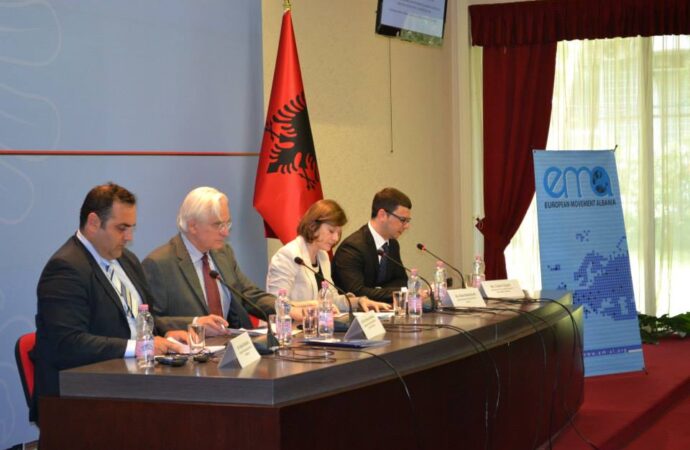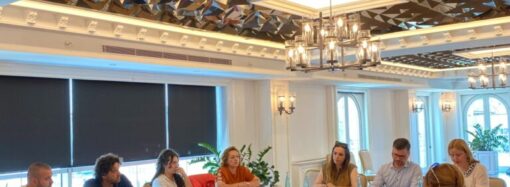On 6 May 2015, European Movement Albania (EMA), in framework of Regional Convention of European Integration and Albanian Chairmanship of the South East European Cooperation Process, organized the International Conference “ Cooperation between state and civil sector In the fields of judiciary and fundamental rights and justice, freedom and security (chapter 23 & 24)”. The Regional Initiative, launched by the three sister organizations European Movement Albania, European Movement Montenegro and European Movement in Serbia, with the financial support of the German Stability Pact and the International Visegrad Fund, offers a great opportunity to promote regionally the examples of good practice and cooperation of the representatives of civil society and institutions established through years. Considering that Albania has currently the Chairmanship of the South East European Cooperation Process, in cooperation with the Ministry of Foreign Affairs the activity increased the impact and outreach of this initiative to other partners in the region. In addition to the platform of Regional Convention, the presence of NGO representatives from South East Europe contributed in sharing experiences and vitalizing the debate on common issues of interest in the process of democratic development and European integration.
Introductory Speeches
The conference was opened by the Welcoming speech of EMA’s Executive Director -Mr. Gledis Gjipali who thanked the presence of representatives from embassies, political personalities, analysts, academia, civil society and media. Ms. Odeta Barbullushi, Deputy Minister of Foreign Affairs in Albania shared her insights on the importance of SEECP in countries of the region and said that governance, policy makers and civil society have a crucial role for the development and progress of these countries and that Chapter 23 & 24 are important on EU integration for Albania and the region. Mr. Hellmut Hoffman, Ambassador of the Federal Republic of Germany in Albania stated that a lot of reforms and positive changes must be done to achieve the EU and claimed the importance of anti-corruption initiatives especially by undertaking concrete proceedings. Mr. Momčilo Radulović, President of European Movement in Montenegro emphasized that the experience from Balkan countries (as Montenegro) should serve as aid for Albania and for the region to share best practices and to achieve more goals in the path toward EU accession.
Migration issues in civil society& government interaction in the context of EU Integration
In the first panel moderated by Ms. Ivana Lazarevic from European Movement Serbia, Mrs. Elona Gjebrea, Deputy Minister of Internal Affairs referring chapter 23 & 24 , stated that civil society is an important and serious partner on cooperation to minimize phenomena like illegal migration, smuggling emigrants, trafficking of human beings or cases of asylum seeker. Even though Albanian government has taken serious steps, there is still need for further measures and new policies. Mrs. Silvana Banushi, General-Director of Ministry of Social Welfare and Youth claimed that migration does not represent a successful history in Albania and the growth of the number of emigrants from Albania shows that circumstances of the country, especially economic ones, play the main role. Mr. Piotr Kazmierkiewicz, Researcher at Institute of Migration Studies, Poland stressed the need to improve regional integration, avoid the underestimating of migration issues and to pay special attention to the role of Think Tanks. Mr. Islam Yusufi, Researcher at Analytica Think Tank, Macedonia, analysed emigration from Macedonian perspective, as a country of origin and transition, considering the Balkan routs a transit for illegal emigrants toward EU countries, where also many non-Europeans are using these routes.
Regional Cooperation in Asylum Management
Ms. Mila Brnovic from European Movement Montenegro moderated the second Panel on asylum management. Mr. Gojko Pantovic, representing Belgrade Center for Human Rights in Serbia said that the asylum system in Serbia isn’t qualified at all, where there is a lack of communication between police structure and refugees and also problems regarding protection of refugee rights. Mr. Hamdi Fırat Büyük, Researcher at USAK Centre for European Studies, Balkans Section in Turkey talked about terrorism in the region as a main problem considering Albanians from Diaspora, the most vulnerable people to be part of ISIS fighters, because of their religious views. Border security should increase, because Syrian refugees are becoming a disturbing problem. Mr. Mentor Vrajolli, Kosovar Centre for Security Studies stressed his concern for the number of asylum seekers from Kosovo. The biggest problem coming from Kosovo is about people going to Iran and Syria to fight and it is necessary to find and fight the phenomena. Ms. Marija Vuksanovic, Center for Democracy and Human Rights, Montenegro mentioning the importance of recent legislative changes and future steps within the axis of the Action Plan for Chapter 24, shared a short introduction of the asylum system in Montenegro and the need of NGOs in the region countries to collaborate together and contribute for the reforms ahead.
Exposing Corruption in South East Europe
The last panel was moderated by Ms. Mona Xhexhaj from European Movement Albania. Mr. Milan Antonijević, Director of Lawyers Committee for Human Rights, Serbia expressing his insights about the situation in Serbia regarding chapter 23. He mentioned the existence of organizations which monitor human rights issues as well as fight against corruption in Serbia, but anyway the regional component remains important for Serbian Integration and other countries of the region. According Mrs. Eridana Çano, from Albanian Anti-Corruption Coordination Office, Albanian institutions have made progress in fight against corruption in prosecuting and punishing it but there is still need of new action and recommendations from international communities and EU, especially for judiciary system. Ms. Bisera Turkovic, Secretary General of European Movement Montenegro considering Chapter 23 a key challenge area, stressed the necessity of anti-corruption efforts and reforms where lobbing, financial laws, reforms on judiciary, the state prosecutor office and cooperation with civil society and NGOs and education play a very important role. Mr. Besar Likmeta, representing Balkan Investigative Reporting Network in Albania claiming on how investigative media is monitoring and reporting problems in Albania, highlighted the role and the need of the media and the continuous cooperation between CSOs and journalists. Mr. István Kiss, researcher at Századvég Foundation, Hungary brought to the audience the Hungarian experience which shows that the fight against corruption is a long way and it doesn’t end by entering the EU, on the contrary, there is always need to fight corruption in high level institutions and in political structures.




















